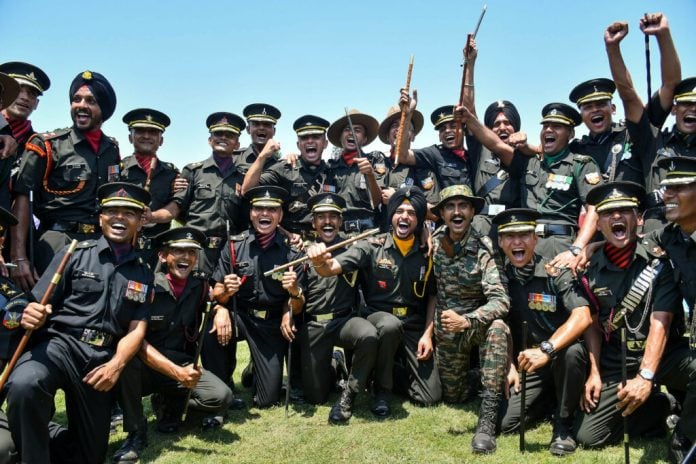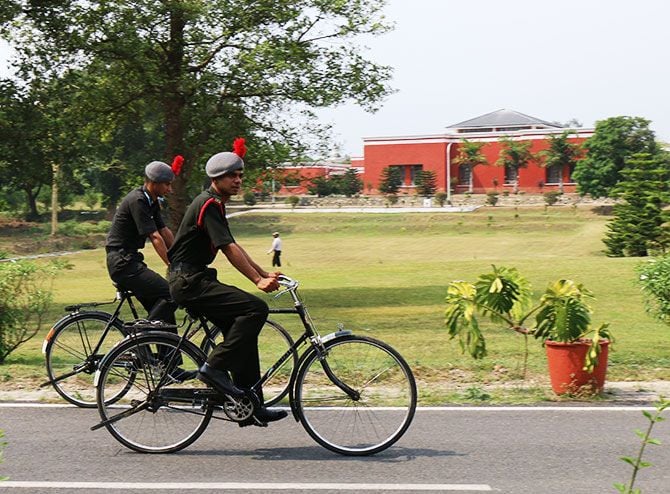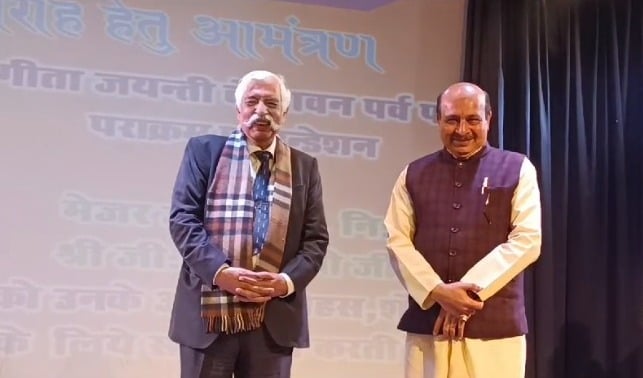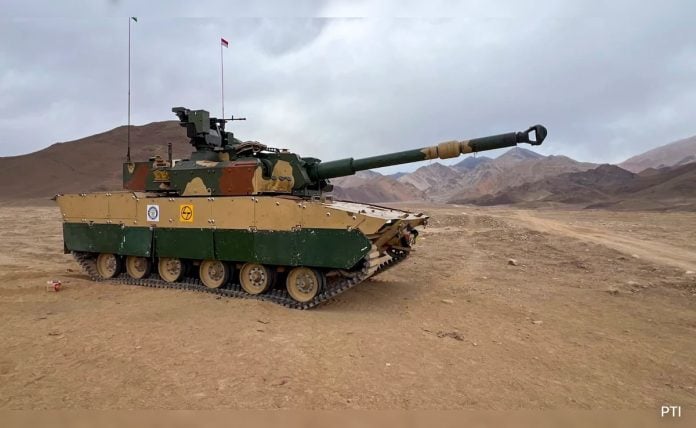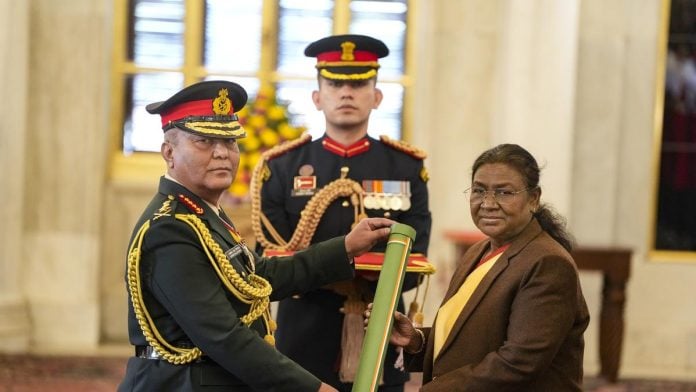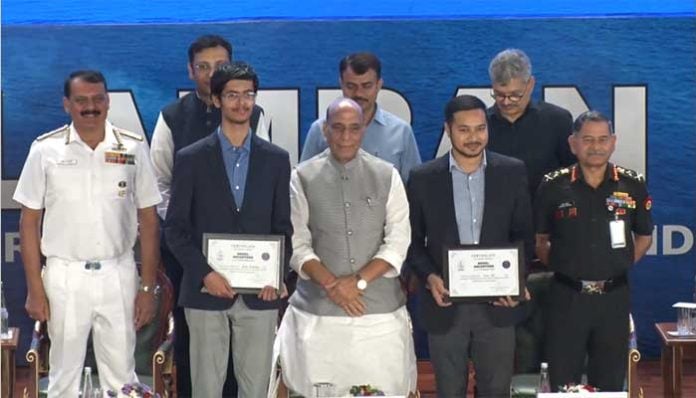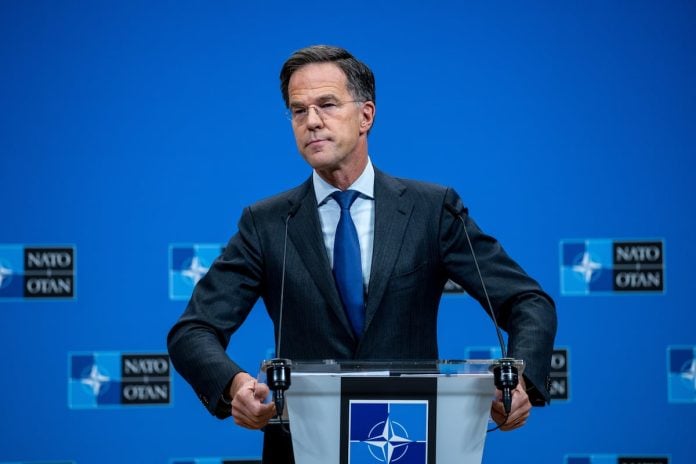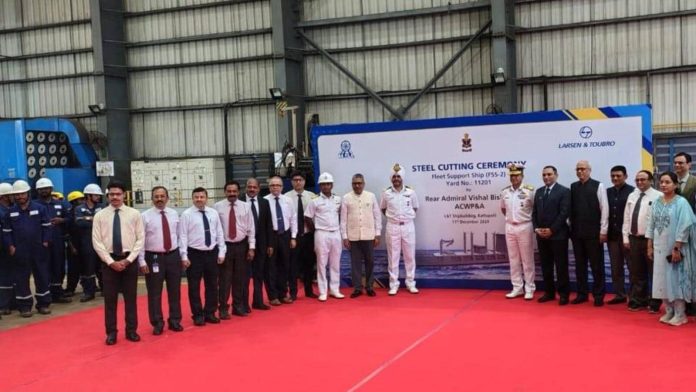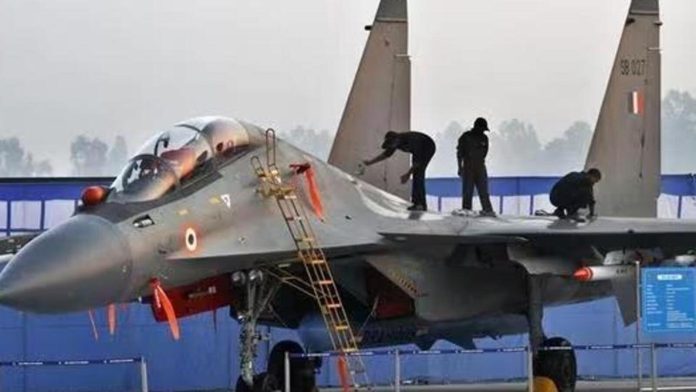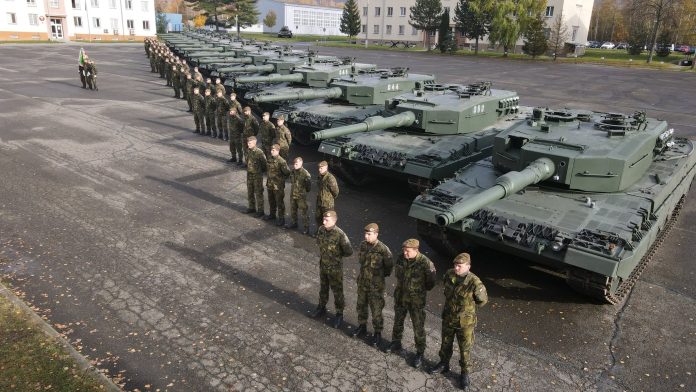The UPSC has published the CDS 1 2025 notification on December 11, 2024. The CDS 1 2025 exam is scheduled to take place on April 13, 2025. As we gear up for the CDS 1 2025 exam, excitement and anticipation are building among aspiring defence officers across India. The Combined Defence Services examination, conducted by UPSC, is a gateway to prestigious military academies and a career in the armed forces.
We understand the significance of this opportunity and the impact it can have on your future, which is why we’re here to guide you through every step of the process.
Join CDS Exam Online Course Today
In this comprehensive guide, we’ll cover all the essential aspects of CDS 1 2025. We’ll dive into the exam date and schedule, break down the eligibility criteria, and walk you through the application process.
What’s more, we’ll share effective preparation strategies to help you ace the exam. Our goal is to equip you with the knowledge and confidence you need to tackle this challenge head-on and take a big step towards your dream of serving the nation.
CDS 1 2025 Exam Date and Schedule
As we gear up for the upcoming Combined Defence Services examination, I’m excited to share the key dates and schedule for CDS 1 2025. This information is crucial for all aspiring candidates to plan their preparation and application process effectively.
CDS 1 2025 Notification Release Date
The Union Public Service Commission (UPSC) has announced that the CDS 1 2025 notification will be released on December 11, 2024. This is when we’ll get all the official details about the exam, including eligibility criteria, application process, and exam pattern. I recommend marking this date on your calendar and keeping an eye out for the notification on the UPSC website.
CDS 1 2025 Application Period
The application period for CDS 1 2025 is set to begin on the same day as the notification release. Candidates will be able to start filling out their online application forms from December 11, 2024. It’s important to note that the last date to submit your application is December 31, 2024. This gives us a window of about three weeks to complete and submit our applications. I advise not to wait until the last minute and submit your application well before the deadline to avoid any last-minute technical issues.
CDS 1 2025 Exam Date
Now, for the most anticipated information – the CDS 1 2025 exam date. UPSC has scheduled the exam for April 13, 2025. This gives us approximately four months from the notification release to prepare for the exam. It’s crucial to use this time wisely and create a structured study plan to cover all aspects of the syllabus.
CDS 1 2025 Result Declaration
As for the result declaration, UPSC typically announces the CDS results in two stages. First, they release the results of the written exam, followed by the final results after the SSB Interview. While the exact date for the CDS 1 2025 result declaration hasn’t been announced yet, based on previous patterns, we can expect the written exam results around June 2025.
I want to emphasize the importance of staying updated with the official UPSC website for any changes or additional information regarding the CDS 1 2025 exam. These dates are crucial milestones in our journey towards a career in the defence services, and being well-prepared at each stage will give us a significant advantage.
Remember, the CDS exam is our gateway to prestigious institutions like the Indian Military Academy, Indian Naval Academy, Air Force Academy, and Officers’ Training Academy. Let’s make the most of this opportunity and start our preparation with full dedication and determination.
Eligibility Criteria for CDS 1 2025
As we prepare for the Combined Defence Services examination, it’s crucial to understand the eligibility criteria for CDS 1 2025. These requirements ensure that candidates are well-suited for a career in the armed forces. Let’s break down the key aspects of eligibility.
CDS 1 2025 Age Limit
The age limit for CDS 1 2025 varies depending on the specific academy you’re applying to.
| Academy | Eligibility Criteria |
|---|---|
| Indian Military Academy (IMA) | Unmarried male candidates born between 2nd Jan, 2002 and 1st Jan, 2007 |
| Indian Naval Academy | Unmarried male candidates born between 2nd Jan, 2002 and 1st Jan, 2007 |
| Air Force Academy | Candidates born between 2nd Jan, 2002 and 1st Jan, 2006 (20 to 24 years on 1st Jan, 2026); CPL holders: born between 2nd Jan, 2000 and 1st Jan, 2006 (up to 26 years old) |
| Officers’ Training Academy (Men) | Unmarried male candidates born between 2nd Jan, 2001 and 1st Jan, 2007 |
| Officers’ Training Academy (Women) | Unmarried women, issueless widows, and issueless divorcees (not remarried) born between 2nd Jan, 2001 and 1st Jan, 2007 |
CDS 1 2025 Educational Qualifications
To be eligible for CDS 1 2025, candidates must have completed or be in the final year of their graduation.
| Academy | Educational Qualification |
|---|---|
| Indian Military Academy (IMA) | Degree from a recognized University or equivalent |
| Officers’ Training Academy (OTA) | Degree from a recognized University or equivalent |
| Indian Naval Academy (INA) | Degree in Engineering from a recognized University/Institution |
| Air Force Academy (AFA) | Degree from a recognized University (with Physics and Mathematics at 10+2 level) or a Bachelor of Engineering |
| Candidates in Final Year | Final year/semester students can apply if they have no backlog up to the last declared result and must provide proof of passing the degree at the time of course commencement |
CDS 1 2025 Nationality Requirements
The CDS 1 2025 exam is open to Indian citizens. However, subjects of Bhutan, Nepal, and Tibetan refugees who came to India before January 1, 1962, with the intention of permanently settling here are also eligible. Additionally, persons of Indian origin who have migrated from Pakistan, Burma, Sri Lanka, and certain East African countries with the intention of permanently settling in India can apply. It’s important to note that candidates falling under these categories must obtain a certificate of eligibility from the Indian government.
Physical Standards
Meeting the physical standards is crucial for a career in the defence services. For male candidates, the minimum acceptable height is 157.5 cm, with slight variations for different branches (157 cm for Navy and 162.5 cm for Air Force). Female candidates must have a minimum height of 152 cm. These standards ensure that candidates can handle the physical demands of military training and service.
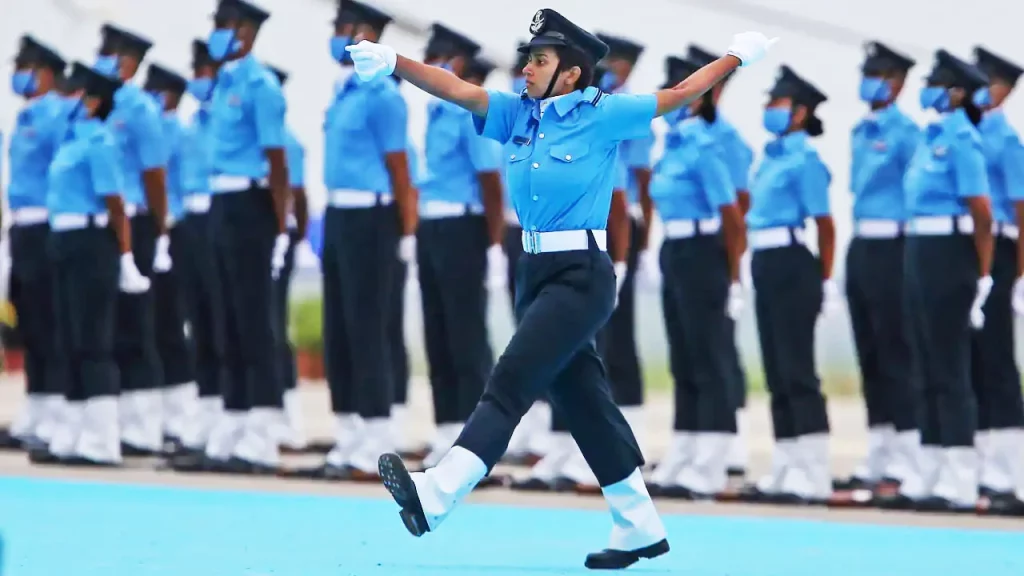
It’s worth noting that there are some relaxations in height requirements for candidates from specific regions. For instance, candidates from the North-Eastern regions, Garhwal, and Kumaon may have a 5 cm relaxation in the minimum height requirement .
As we gear up for CDS 1 2025, it’s essential to carefully review these eligibility criteria. Meeting these requirements is the first step towards realizing our dream of serving in the Indian Armed Forces. Remember, the UPSC conducts thorough checks, so ensure you meet all criteria before applying. Let’s use this information to assess our eligibility and prepare accordingly for this prestigious examination.
CDS 1 2025 Application Process
As we gear up for the CDS 1 2025 exam, I’m excited to guide you through the application process. The Union Public Service Commission (UPSC) has made the process straightforward, but it’s crucial to follow each step carefully to ensure your application is successful.
Online Application Steps
The CDS 1 2025 application form will be available on the UPSC website from December 11, 2024. Here’s a step-by-step guide to help you navigate the process:
- Visit the official UPSC website (www.upsc.gov.in).
- Look for the “CDS 1 2025 Apply Online” link on the homepage.
- Start with the One-Time Registration (OTR) if you haven’t done so already.
- Fill in your basic information, including name and personal details.
- You’ll receive an OTP on your registered mobile number for verification.
- Once verified, proceed to fill out the main application form.
- Provide your personal information, communication details, and academic qualifications.
- Select your exam center and preferences for IMA, NA, AFA, and OTA.
- Review all the details carefully before submitting.
Remember, the application process is divided into two parts. Part I involves basic registration, while Part II includes fee payment and document upload.
Required Documents
To complete your application, you’ll need to have the following documents ready:
- Class 10 and 12 mark sheets and passing certificates
- Graduation certificate
- Passport-sized photograph
- Scanned signature
- Valid photo ID (Aadhaar Card, PAN Card, Voter Card, Driving License, or Passport)
Ensure that your photograph and signature meet the specified size requirements – not exceeding 300 KB and not less than 20 KB.
CDS 1 2025 Application Fee
The application fee for CDS 1 2025 varies based on your category:
- General and OBC male candidates: ₹200
- Female candidates and SC/ST candidates: No fee
You can pay the fee online using credit/debit cards, net banking, or UPI. If you prefer, there’s also an option to pay offline at any SBI branch using a challan.
Important Instructions
- Double-check all information before submitting. Incorrect details may lead to disqualification.
- Keep your login credentials (application number and date of birth) safe for future reference.
- After submission, take a printout of the completed application form.
- UPSC typically provides a correction window in January 2025. Use this opportunity to make any necessary changes to your application.
As we embark on this journey towards a career in the defence services, let’s approach each step of the application process with care and attention to detail. Remember, a well-filled application is your first step towards success in the CDS 1 2025 exam. Stay focused, and let’s make our dream of serving the nation a reality!
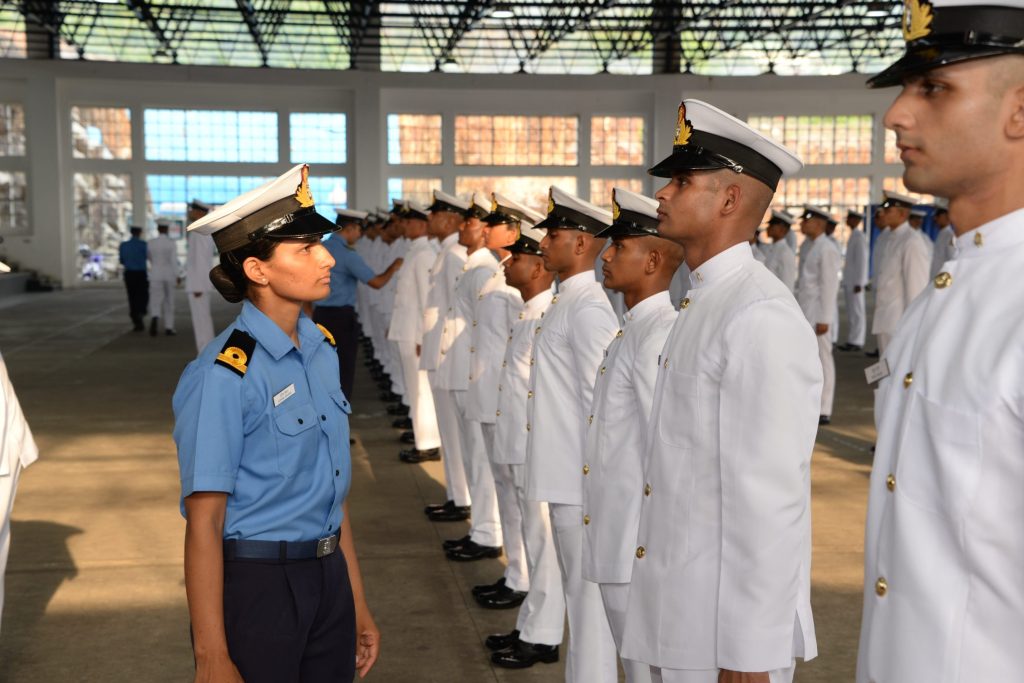
Preparation Strategy for CDS 1 2025
As we gear up for the CDS 1 2025 exam, it’s crucial to have a solid preparation strategy in place. Let’s break down the key elements that will help us excel in this challenging examination.
CDS 1 2025 Syllabus Overview
The CDS 1 2025 syllabus covers a wide range of subjects, designed to assess our suitability for the Indian Armed Forces.
Here is a simple table based on the admission details provided:
| Academy | Subject | Code | Duration | Maximum Marks |
|---|---|---|---|---|
| IMA | English | 11 | 2 Hours | 100 |
| General Knowledge | 12 | 2 Hours | 100 | |
| Elementary Mathematics | 13 | 2 Hours | 100 | |
| INA | English | 11 | 2 Hours | 100 |
| General Knowledge | 12 | 2 Hours | 100 | |
| Elementary Mathematics | 13 | 2 Hours | 100 | |
| AFA | English | 11 | 2 Hours | 100 |
| General Knowledge | 12 | 2 Hours | 100 | |
| Elementary Mathematics | 13 | 2 Hours | 100 | |
| OTA | English | 11 | 2 Hours | 100 |
| General Knowledge | 12 | 2 Hours | 100 |
The exam consists of three main sections: English, General Knowledge, and Elementary Mathematics. The English section tests our language proficiency, including grammar, vocabulary, and comprehension skills. The General Knowledge section evaluates our awareness of current events, history, geography, polity, economics, and science. For those aspiring to join the Indian Military Academy, Indian Naval Academy, or Air Force Academy, the Elementary Mathematics section is crucial, covering topics like arithmetic, algebra, geometry, and trigonometry.
| Subject | Code | Syllabus |
|---|---|---|
| English | 01 | Designed to test understanding of English and effective use of words. |
| General Knowledge | 02 | General knowledge of current events, scientific aspects of everyday life, and basic history and geography. |
| Elementary Mathematics | 03 | Arithmetic: Number system, fundamental operations, time & distance, percentages, interest, profit & loss, ratio & proportion. Elementary Number Theory: Division algorithm, prime numbers, H.C.F., L.C.M., logarithms. Algebra: Operations, quadratic equations, set theory, laws of indices. Trigonometry: Sine, cosine, tangent, trigonometric identities, heights & distances. Geometry: Lines, angles, triangles, congruency, parallelograms, circles, loci. Mensuration: Areas and volumes of common geometric shapes (squares, rectangles, triangles, cuboids, cylinders, cones, etc.). Statistics: Data collection, graphical representation, measures of central tendency (mean, median, mode). |
CDS 1 2025 Recommended Study Materials
To ensure comprehensive preparation, we need to rely on high-quality study materials. NCERT textbooks from classes 6 to 12 serve as an excellent foundation for most subjects. For English, focus on improving vocabulary and grammar through dedicated practice books. For General Knowledge, stay updated with current affairs by reading reputable newspapers and magazines. Mathematics preparation can be enhanced by solving previous year question papers and practicing from standard reference books.
CDS 1 2025 Mock Tests and Previous Papers
One of the most effective strategies for CDS 1 2025 preparation is solving mock tests and previous year papers. These resources help us familiarize ourselves with the exam pattern, question types, and time management. Aim to solve at least five mock tests and previous year papers to gage your progress and identify areas that need improvement. Online platforms and coaching institutes offer a variety of mock tests that simulate the actual exam environment.
CDS 1 2025 Time Management Tips
Effective time management is crucial for success in the CDS 1 2025 exam. Create a structured study plan that allocates specific time slots for each subject. Dedicate 6-8 hours daily to your preparation, ensuring a balance between all sections of the syllabus. Break your study sessions into manageable chunks, focusing on one topic at a time. Regular revision is key to retaining information, so set aside time for weekly reviews of covered topics.
Remember, consistency and dedication are paramount in our journey towards cracking the CDS 1 2025 exam. By following this preparation strategy and staying committed to our goals, we can increase our chances of success and take a significant step towards our dream of serving in the Indian Armed Forces.
Conclusion
The journey to become a part of the Indian Armed Forces through the CDS 1 2025 exam is both challenging and rewarding. This guide has shed light on the key aspects of the exam, from important dates to preparation strategies. Armed with this knowledge, aspiring candidates are now better equipped to tackle the rigorous selection process and take a big step towards their dream of serving the nation.
As we wrap up, it’s crucial to remember that success in the CDS exam goes beyond academic preparation. It requires unwavering dedication, physical fitness, and a strong sense of patriotism. By starting early, staying consistent in preparation, and maintaining a balanced approach, candidates can boost their chances of success. The path ahead may be tough, but the reward of donning the uniform and protecting our nation’s integrity makes every effort worthwhile.
FAQs
What is CDS 1 2025 exam date?
CDS 1 2025 exam date is 13 April 2025.
What is CDS 1 2025 Notification date?
CDS 1 2025 notification will be published on 11 December 2024
What is CDS 1 2025 Age Limits?
The CDS exam age limits are maximum 24 years for IMA, INA, AFA and 26 years for OTA. Complete age limits can be checked on ssbcrack.com

